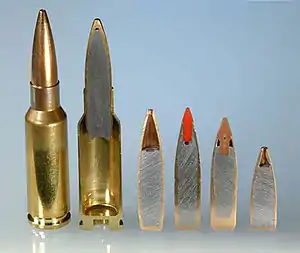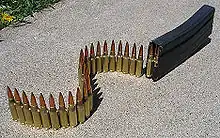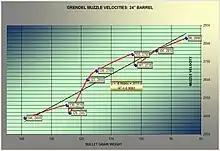| 6.5mm Grendel | ||||||||||||||||||||||||
|---|---|---|---|---|---|---|---|---|---|---|---|---|---|---|---|---|---|---|---|---|---|---|---|---|
 6.5mm Grendel showing variety of bullets—144 gr (9.3 g) to 90 gr (5.8 g) | ||||||||||||||||||||||||
| Type | Rifle | |||||||||||||||||||||||
| Place of origin | United States | |||||||||||||||||||||||
| Production history | ||||||||||||||||||||||||
| Designer | Bill Alexander and Janne Pohjoispää | |||||||||||||||||||||||
| Designed | 2003[1] | |||||||||||||||||||||||
| Specifications | ||||||||||||||||||||||||
| Parent case | .220 Russian (5.6×39mm)[2] | |||||||||||||||||||||||
| Case type | Rimless, bottleneck | |||||||||||||||||||||||
| Bullet diameter | 6.71 mm (0.264 in) | |||||||||||||||||||||||
| Land diameter | 6.50 mm (0.256 in) | |||||||||||||||||||||||
| Neck diameter | 7.44 mm (0.293 in) | |||||||||||||||||||||||
| Shoulder diameter | 10.87 mm (0.428 in) | |||||||||||||||||||||||
| Base diameter | 11.15 mm (0.439 in) | |||||||||||||||||||||||
| Rim diameter | 11.2 mm (0.44 in) | |||||||||||||||||||||||
| Rim thickness | 1.5 mm (0.059 in) | |||||||||||||||||||||||
| Case length | 38.7 mm (1.52 in) | |||||||||||||||||||||||
| Overall length | 57.5 mm (2.26 in) | |||||||||||||||||||||||
| Case capacity | 2.3 cm3 (35 gr H2O) | |||||||||||||||||||||||
| Rifling twist | 1 in 200 mm (8 in) or 1 in 230 mm (9 in) | |||||||||||||||||||||||
| Primer type | Small rifle | |||||||||||||||||||||||
| Maximum pressure | 360 MPa (52,000 psi) | |||||||||||||||||||||||
| Ballistic performance | ||||||||||||||||||||||||
| ||||||||||||||||||||||||
| Test barrel length: 24 inches (610 mm) Source(s): Alexander Arms Pressure-safe Load Data | ||||||||||||||||||||||||
The 6.5mm Grendel is an intermediate cartridge jointly designed by British-American armorer Bill Alexander, competitive shooter Arne Brennan (of Houston, Texas) and Lapua ballistician Janne Pohjoispää, as a low-recoil, high-precision rifle cartridge specifically for the AR-15 platform at medium/long range (200–800 yard). It is an improved variation of the 6.5mm PPC.[4]
The 6.5mm Grendel cartridge was first unveiled in May 2003 at the Blackwater Training Facility in North Carolina, where it remained supersonic at 1,200 yd (1,100 m) range and out-shot the 7.62mm NATO with only half the recoil.[5] Since its introduction, it has proven to be a versatile cartridge and is now expanding into other firearm design platforms including bolt-action rifles and the Kalashnikov system.[6]
The name "Grendel" is inspired by the mythical monster antagonist from the Old English epic poem Beowulf.[7] It was a trademark owned by Alexander Arms (Bill Alexander's company in Radford, Virginia) and manufactured at Radford Arsenal,[8] until legally released in 2010 for SAAMI standardization with collaboration from Hornady.[7][9][10]
Development and history
The goal of the 6.5mm Grendel design was to create an effective STANAG magazine-length cartridge for the AR-15 platform that could reach 200–800 yd (180–730 m) and surpass the performance of the native 5.56mm NATO/.223 Remington cartridge. Constrained by the dimension of the STANAG magazines, the Grendel's designers decided to use a shorter, larger-diameter case for higher powder volume while allowing space for the long, streamlined, high ballistic coefficient 6.5mm (.264 cal.) bullets. Firing factory-loaded ammunition with bullets ranging from 90 to 129 grains (5.8 to 8.4 g), its muzzle velocity varies from 2,500 ft/s (760 m/s) with 129- and 130-grain (8.4 g) bullets to 2,900 ft/s (880 m/s) with 90 gr (5.8 g) bullets (similar in velocity to a 77-grain (5.0 g) 5.56 mm round). Depending on their case material and bullet weight, 6.5mm Grendel cartridges weigh 14.7 to 17.8 grams (227 to 275 gr).
The case head diameter of the Grendel is the same as that of the 5.6×39mm (.220 Russian), 7.62×39mm and 6.5mm PPC cases. This diameter is larger than the 5.56×45mm NATO, thereby necessitating the use of a non-standard AR-15 bolt. The increased case diameter results in a small reduction in the magazine ammo capacities. A 6.5mm Grendel magazine with the same dimensions as a 30-round STANAG magazine will hold 26 rounds of Grendel ammunition.
Performance

Proponents assert that the Grendel is a good "middle ground" between the 5.56×45mm NATO and the 7.62×51mm NATO. It retains greater terminal energy at extended ranges than either of these cartridges due to its higher ballistic coefficient (BC).[2] For example, the 123 gr (8.0 g) 6.5 mm Grendel bullet has more kinetic energy and better body armor penetration at 1,000 m (1,100 yd) than the larger and heavier 147 gr (9.5 g) bullet of the M80 7.62mm NATO round.[11][12][13][14]
In order to obtain ballistics that are superior to the 7.62×51mm cartridge, a weapon with a longer barrel and firing a heavier bullet is necessary. To achieve the same results from shorter-length barrels, even heavier bullets are needed.[15]
External ballistics

| Bullet velocity: 24 inch (609.6 mm) barrel | ||||||
|---|---|---|---|---|---|---|
| Bullet mass | Muzzle velocity | 1,000 meter velocity | ||||
| gr | g | ft/s | m/s | ft/s | m/s | |
| Lapua Scenar | 108 | 7.0 | 2,700 | 820 | 1,166 | 355 |
| Lapua Scenar | 123 | 8.0 | 2,620 | 800 | 1,222 | 372 |
| Lapua FMJBT | 144 | 9.3 | 2,450 | 750 | 1,213 | 370 |
As noted above, the Grendel case is very closely related to the .220 Russian case. In general, each additional grain of bullet weight will reduce muzzle velocity by 10.8 ft/s (50.8 m/s for each gram) and each additional inch of barrel length will increase muzzle velocity by 20 ft/s (2.4 m/s for each centimeter). Specific details are available as graphs derived from Alexander Arms' public domain load table linked below.
LE and Military usage
Serbia is in process of adopting a rifle made by Zastava Arms[16] in 6.5 mm Grendel caliber as main armament for its armed forces. The rifle, designated Zastava M19, is a derivative of the previous-issue M70 rifle.[17] An American-manufactured rifle in 6.5mm Grendel caliber may also be adopted in armament for special forces units after it passes testing in Technical Testing Center. Three types of 6.5mm Grendel ammunition produced by Prvi Partizan, Užice, Serbia will be tested for use with these rifles.[18][19][20][21][22]
See also
- .220 Russian (5.6×39 mm)
- .224 Valkyrie (5.6×41 mm)
- 6mm PPC
- 6mm AR, a 6 mm wildcat version which shares 6.5 Grendel's casing, but sends a (usually) lighter projectile up to 1,000 yards (900 m).
- 6mm ARC, a factory cartridge with many similarities to the 6mm AR
- 6.5×55mm Swedish
- 6.5mm Creedmoor
- 6.5×42mm, also known as 6.5 MPC (Multi Purpose Cartridge), based on a necked up .223 Remington case.[23]
- 6.8mm Remington SPC
- 7.62×37mm Musang
- 7.62×39mm
- List of AR platform cartridges
- List of rifle cartridges
- Table of handgun and rifle cartridges
References
- ↑ "6.5mm Grendel (internet archive copy)". Alexander Arms. Archived from the original on January 9, 2012. Retrieved 2015-10-22.
- 1 2 Guthrie, J (November 16, 2012). "6.5mm Grendel: The Round the Military Ought to Have". Shooting Times. Retrieved March 8, 2013.
- ↑ "Products - Lapua". Archived from the original on 2016-01-08. Retrieved 2016-01-04.
- ↑ Lewis, Jack (2007). The Gun Digest Book of Assault Weapons. Gun Digest Books. p. 77. ISBN 978-0-89689-498-3.
- ↑ "6.5 Grendel". Alexander Arms. Retrieved 2021-06-04.
- ↑ Outdoor Hub, Prototype 6.5 Grendel AK Rifle from Definitive Arms, 13 October 2015
- 1 2 Gash, Steve (2015-07-01). "Alexander Arms 6.5 Grendel Hunter Review". Gun Digest. Retrieved 2021-06-04.
- ↑ "Company History". Alexander Arms. Retrieved 2021-06-04.
- ↑ ""Alexander Arms Announces: The 6.5 Grendel Is An Official SAAMI Cartridge "". Archived from the original on 2019-08-13. Retrieved 2012-02-18.
- ↑ "6.5 Grendel is Approved as SAMMI Cartridge — Alexander Arms Gives up "6.5 Grendel" Trademark « Daily Bulletin".
- ↑ The Case for a General-Purpose Rifle and Machine Gun Cartridge (GPC) by Anthony G Williams Archived 2014-11-09 at the Wayback Machine
- ↑ Ehrhart, Thomas P. Increasing Small Arms Lethality in Afghanistan: Taking Back the Infantry Half Kilometer. pg 37-38
- ↑ Infantry Weapons Conference Report – SAdefensejournal.com, 9 January 2012
- ↑ Another 7.62mm Bullet For M-16s – Strategypage.com, 8 January 2012
- ↑ The Army’s Individual Carbine Competition: What’s Next? – SAdefensejournal.com, 24 October 2013
- ↑ "Untitled photograph of multiple guns". Archived from the original on 2016-08-27. Retrieved 2016-07-26.
- ↑ "FIRST Military 6.5 Grendel Rifle? – 6.5mm Zastava M17 AK DMR in Testing by Serbian Army -". 22 November 2017.
- ↑ "Prvi Partizan Ammunition".
- ↑ "Prvi Partizan Ammunition".
- ↑ "Prvi Partizan Ammunition".
- ↑ "Војска Србије". Archived from the original on 2016-07-24. Retrieved 2016-07-26.
- ↑ "Why Universal Service Cartridges Will Never Happen". 6 October 2016. Archived from the original on 27 June 2018. Retrieved 14 May 2017.
- ↑ The 6.5 MPC cartridge by SSK developed by J.D. Jones at SSK Industries | Article on DefenseReview.com
Bibliography
- Guns 'n' Ammo: Book of the AR-15, 2004, "The 6.5mm Grendel", David Fortier, p. 66.
- Special Weapons for Military & Police, Annual #27 2004, "Beyond the 5.56mm NATO", Stan Crist, pp. 62–67.
- Guns 'n' Ammo: Book of the AR-15, 2005, "6.5mm Grendel and 6.8 SPC", David Fortier, pp. 32–44.
- Shooting Times, February 2005, "Cooking up Loads for the 6.5mm Grendel", David Fortier, pp. 52–56.
- Shooting Illustrated, September 2005, "6.5mm Grendel and Alexander Arms", J. Guthrie, pp. 34–37, 67–69.
- Petersen's: Rifle Shooter, March/April 2006, "Cartridge Efficiency—Why case shape matters", M. L. McPherson, pp. 22–24.
- Shooting Times, January 2007, "Other AR Chamberings", Sidebar Article, David Fortier, p. 56.
- Special Weapons, Semi-Annual #50 2007, "The Super Versatile AR", Charlie Cutshaw, pp. 44–45, 80–83.
- Special Weapons, Semi-Annual #50 2007, "5.56mm NATO Alternatives", Stan Crist, pp. 52–59.
- Shooting Times, March 2007, "Les Baer's 6.5mm Grendel AR Sets a New Standard", David Fortier, pp. 26–32.
- Special Weapons for Military & Police #52, Spring 2007, "BETTER-IDEA 6.5mm GRENDEL", Stan Crist
- Special Weapons for Military & Police #52, Spring 2007, "New Battlefield Requirements—New Rifles and Ammo Needed", Charlie Cutshaw
